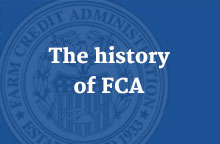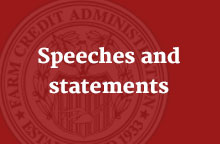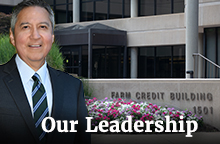What we do
OIG conducts audits, inspections, evaluations, and investigations of agency programs and operations. It also reviews existing and proposed legislation and regulations that affect FCA's programs and offices.
-
OIG conducts audits, inspections, and evaluations of agency programs and operations. Some audits, inspections, and evaluations are specifically required by statute.
An audit is an independent, formal, and methodical examination of an organization, program, function, or activity. FCA audits are required to comply with Government Auditing Standards (commonly called the Yellow Book). Through the audit process the OIG helps ensure that FCA accomplishes its mission efficiently and effectively.
Generally, inspections and evaluations are reviews of a more limited scope than audits. They are performed in accordance with the CIGIE Quality Standards for Inspection and Evaluation.
Audits, inspections, and evaluations may be categorized as either financial or performance reviews.
Financial reviews
Financial reviews include financial statement audits and any other reviews related to FCA’s financial operations. The objective of these reviews is to determine whether FCA’s financial statements present fairly the financial position, results of operations, and cash flows. For recent financial statement audits, go to Inspector general plans and reports.
Performance reviews
There are two types of performance reviews: economy and efficiency, and program reviews. Economy and efficiency reviews determine
- whether the entity is acquiring, protecting, and using its resources (such as personnel, property, and space) economically and efficiently;
- the causes of any inefficiencies or uneconomical practices; and
- whether the entity has complied with laws and regulations on matters of economy and efficiency.
In program reviews, OIG evaluates selected FCA administrative and program operations, focusing on whether management controls, practices, processes, and procedures are adequate and effective. Program reviews also determine:
- the extent to which desired results or benefits established by the legislation or other authorizing body are being achieved;
- the effectiveness of an organization, program, activity, or function; and
- whether the entity has complied with significant laws and regulations applicable to the program.
The audit, inspection, and evaluation process
For each fiscal year, OIG develops an audit, inspection, and evaluation plan. This plan outlines potential reviews to conduct, the objectives of each review, and the resources required to conduct them.
In developing the audit, inspection, and evaluation plan for the year, OIG considers the following:
- Issues that may pose a risk to FCA’s mission
- Interests of FCA’s board members and senior managers
- Interests of Congress and others
The audit, inspection, and evaluation process involves the following steps:
- Planning. OIG reviews pertinent laws, regulations, policies, and other background information to start the audit, inspection, or evaluation process.
- Notification. OIG notifies accountable managers of its intent to begin a review.
- Entrance conference. OIG advises agency officials of the objectives and scope of the review and the general methodology that will be followed, and solicits input from agency officials.
- Field work. OIG analyzes selected areas of a program, activity, or function. It obtains sufficient evidence to support the findings and conclusions and to make recommendations or agreed-upon actions. (A recommendation is an OIG suggestion to solve a problem or improve a condition. An agreed-upon action is an action that both management and OIG have agreed will be taken to solve a problem or improve a condition.)
- Draft audit, inspection, or evaluation report. OIG drafts a report to document the objectives, review, findings, recommendations, and/or agreed-upon actions resulting from OIG’s audit, inspection, or evaluation.
- Exit conference. OIG meets with the accountable manager(s) to validate the facts contained in the draft report and to obtain management’s views on OIG’s findings and conclusions. OIG strives to maintain an open channel of communication with managers to ensure that findings, conclusions, recommendations, and/or agreed-upon actions are accurately and fairly presented in the report.
- Final draft report. OIG amends the draft report, as appropriate, based on management’s input and reissues it to management for an official written response.
- Management response. Management officials respond in writing to the final draft report, indicating how they plan to correct any deficiencies identified in the report. If the Inspector General receives that response within 30 days, OIG includes it with the final report.
- Audit follow-up. OIG staff and the agency’s audit follow-up official monitor agency managers’ actions to ensure that recommendations are followed and agreed-upon actions are taken.
- Audit, inspection, or evaluation report distribution. OIG distributes reports to the chairman, board members, and the accountable managers. These final reports are normally public documents and are available on the FCA website. Information from audit, inspection, and evaluation reports is summarized in OIG’s Semiannual report to Congress.
-
OIG investigates allegations of misconduct involving the programs and operations of FCA. Our investigations comply with the CIGIE Quality Standards for Investigations.
Our investigations focus on allegations of wrongdoing and may address administrative, civil, and criminal violations of laws and regulations. The subject of an OIG investigation can be any agency employee, contractor, or consultant, or any person or entity involved in alleged wrongdoing affecting the FCA's programs and operations.
If an investigation reveals evidence of criminal activity, OIG refers the matter to the Department of Justice for possible prosecution or recovery of monetary damages and penalties. If OIG finds evidence of misconduct, it forwards a report of investigation to the appropriate management officials for consideration of disciplinary or remedial action.
OIG's hotline is available 24 hours a day, 7 days a week, to receive and process tips and complaints about fraud, waste, or abuse related to FCA programs and operations. The hotline allows individuals to report their allegations to OIG directly and confidentially. To contact OIG through the hotline, call 800-437-7322 or email [email protected].
-
OIG reviews existing and proposed legislation, regulations, directives, and policy initiatives that affect FCA’s programs and offices. The objective is to evaluate their impact on FCA’s economy and efficiency and on the prevention of fraud and abuse.
Any significant concerns are documented in a regulatory commentary and provided to the agency for consideration.
The statutory intent of the regulatory commentary is to identify potential problems and assist in preventing them; therefore, OIG does not always request formal replies. However, significant observations regarding action or inaction by the agency are reported in OIG’s Semiannual report to Congress.
Regulatory commentaries contain the following information:
- A citation of the IG Act as authority for the review
- The specific law, regulation, directive, or policy examined
- Pertinent background information
- The OIG’s concerns, observations, and objections



